 Petzlover
Petzlover Birman is originated from France but Korat is originated from Thailand. Both Birman and Korat are having almost same weight. Both Birman and Korat has same life span. Both Birman and Korat has same litter size. Birman requires Moderate Maintenance. But Korat requires Low Maintenance
Birman is originated from France but Korat is originated from Thailand. Both Birman and Korat are having almost same weight. Both Birman and Korat has same life span. Both Birman and Korat has same litter size. Birman requires Moderate Maintenance. But Korat requires Low Maintenance
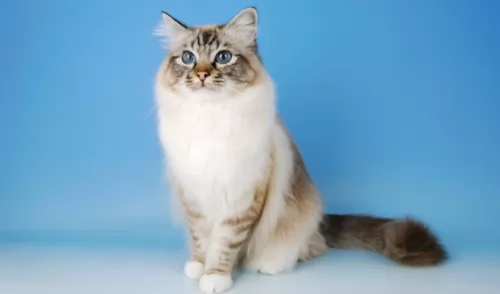 There isn’t clarity as to this exquisite cat’s origins. Many people believe they originated as the companions of temple priests in northern Burma.
There isn’t clarity as to this exquisite cat’s origins. Many people believe they originated as the companions of temple priests in northern Burma.
The cats somehow found their way to France, and it is believed that they have been in France since the 1920s.
The cats nearly disappeared during World War II, but luckily the remaining Birmans that survived were crossed with Siamese and Persians to strengthen the breed. In the early 1950s, pure Birnam litters were produced. It was in about 1959 that Birmans were brought to the United States.
The cats were also recognized in Britain in 1965 and in 1966 by the CFA. The first Birman cats were seal point but later other colors were brought in such as red, chocolate, and tabby.
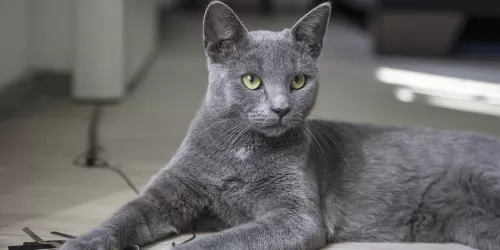 The Korat cat is a breed of domestic cat. He is a natural breed and originates from Phimai in Thailand.
The Korat cat is a breed of domestic cat. He is a natural breed and originates from Phimai in Thailand.
It is thought that the cat is named after its province of origin – Nakhon Ratchasima Province which is actually called Korat by the Thai people.
The cat is also known as the ‘Good Luck’ cat. The cats first appeared in Britain under the name Blue Siamese and later in the United States in the 1950s.
It was in 1959 that a cattery started with breeding and in 1966 the Korat was accepted into championship status.
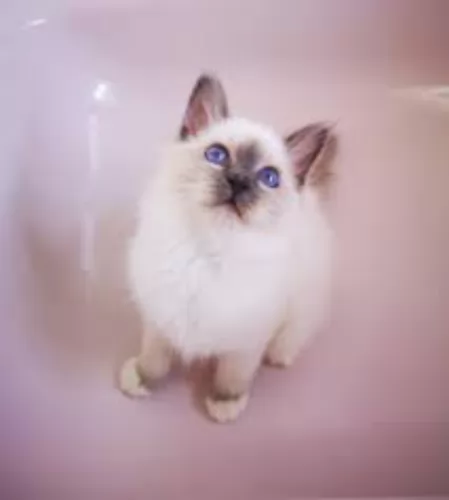 These are medium-sized cats which can become fairly large. They can weigh up to 4, 5 or 6kg. They are fairly heavily boned with a broad face and ears that are widely spaced.
These are medium-sized cats which can become fairly large. They can weigh up to 4, 5 or 6kg. They are fairly heavily boned with a broad face and ears that are widely spaced.
The round eyes are deep blue. The cat’s fur is medium-long and should be silky to the touch with no undercoat. Ther cat is a moderate shedder.
The base color is whitish to cream, but the kittens are always born white. Coat color, whether red, cream, or chocolate is always pointed and the cat always has the white paws.
The Birman isn’t as outgoing as some of the other cat breeds and its a quiet, docile intelligent cat that attaches itself to one particular family member. They can actually become jealous of their human companion and demand their attention.
These friendly cats are wonderful choices for families with children and dogs. They are calm and affectionate, and softly spoken, quietly letting you know when it’s dinner time and enjoying just being around his human family.
He is able to get along well with kids and other pets in the home. He can become quite playful too and because he is so intelligent, you can buy him some toys that require him to think.
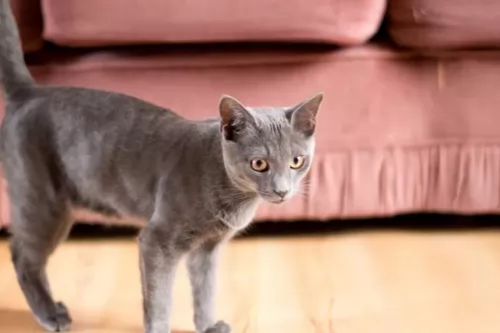 The Korat is a short-haired, single coated cat breed that has a small to medium build. He stands at about 25 – 30cm in height.
The Korat is a short-haired, single coated cat breed that has a small to medium build. He stands at about 25 – 30cm in height.
He weighs about 3 to 5kg. He is known for his large, beautiful green eyes. It’s a beautiful blue-grey cat with unusual coloring - a shimmering silver-tipped blue that the Thai people refer to as ‘rain-cloud grey’.
With his silver-tipped blue-grey coat and large green eyes, this is indeed a beautiful cat.
The Korat is a friendly cat and can get along well with children who have been taught to be kind to animals and to respect them.
They’re also cats that like to make friends with other pets in the family. They also enjoy the companionship of their human family. They’re intelligent cats too and you won’t have trouble teaching him a trick or two.
He doesn’t want to be left alone and if you work full-day, it would be best to get such a cat another cat companion. He isn’t a noisy cat but fairly quiet, enjoying a quiet environment.
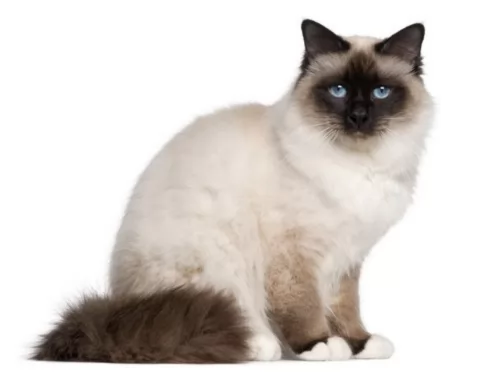 The Birman cat has to be one of the most beautiful cats there are, but the cat isn’t only a beautiful cat, it has wonderful characteristics as well.
The Birman cat has to be one of the most beautiful cats there are, but the cat isn’t only a beautiful cat, it has wonderful characteristics as well.
It is a loving, affectionate cat with his human family, loving to spend time around them. Playful and healthy, when you bring this most wonderful cat into your home, it will be as though an angel has come to stay.
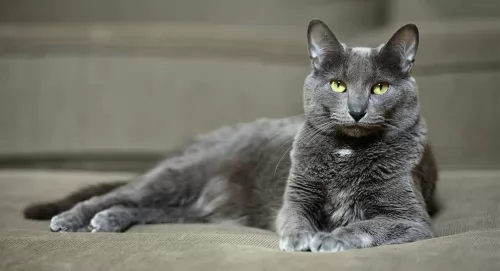 Think carefully before you take a cat into your life. If you are hardly ever at home, some cat breeds are very social, and this quiet, solitary lifestyle will be detrimental to their health.
Think carefully before you take a cat into your life. If you are hardly ever at home, some cat breeds are very social, and this quiet, solitary lifestyle will be detrimental to their health.
If you aren’t willing to learn what the nature of a cat is, your cat will be unhappy and you’ll spend a lot on vet’s fees as his immune system will be compromised.
It would be most unkind to take a Korat cat into your home and not understand something of its behavior. A cat such as the Korat thrives on plenty of love and attention.
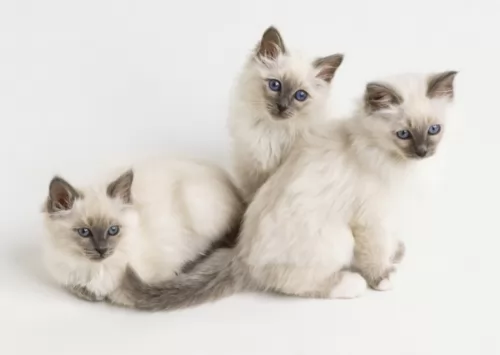 With good health your Birman can reach up to 13 years of age. With the Birman, the most serious illness is feline hypertrophic cardiomyopathy which also happens to be the most common heart disease in cats.
With good health your Birman can reach up to 13 years of age. With the Birman, the most serious illness is feline hypertrophic cardiomyopathy which also happens to be the most common heart disease in cats.
It’s a progressive disease and can result in heart failure. The cats are also at risk of developing feline infectious peritonitis.
Also, because this is a larger cat and a stocky kind of breed, it can easily put on weight and then become overweight. Strict attention will need to be given to diet as well as daily exercise.
Also, look out for Corneal dermoid - skin and hair on the surface of the cornea in one eye or in both. Luckily this is an eye problem that can be surgically corrected.
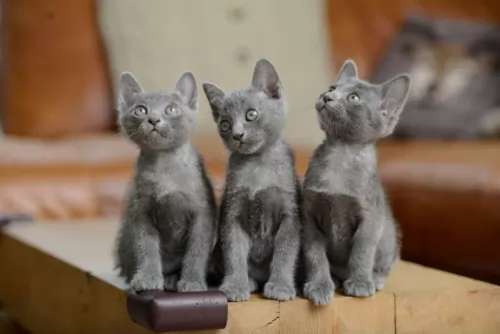 The Korat is generally healthy but even so, there are always one or two cat ailments that need to be sorted out.
The Korat is generally healthy but even so, there are always one or two cat ailments that need to be sorted out.
If your Korat cat succumbs to any one of the common cat illness there are, get veterinary help. These illnesses can be cancer, feline leukemia virus, diabetes and heartworm among others.
Feline Lower Urinary Tract Disease (FLUTD) can be found in male and female cats, often occurring in cats that are overweight or stressed.
Your cat will strain to urinate, may vomit, will have a lack of appetite, lick around the urinary area, and be most miserable. The problem is regarded as an emergency and you need to get your cat to the vet as soon as possible.
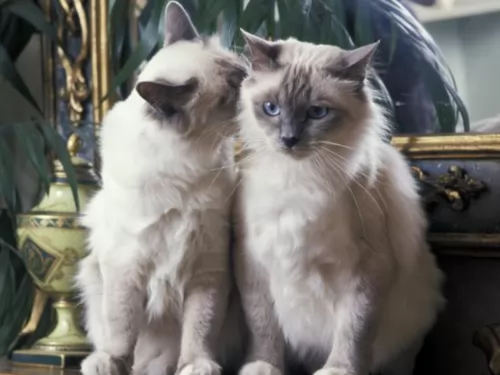 The Birman has a silky coat that sheds moderately so you want to give him a gentle brush once or twice a week to keep the coat of his soft and silky.
The Birman has a silky coat that sheds moderately so you want to give him a gentle brush once or twice a week to keep the coat of his soft and silky.
The Birman has a full topcoat, with no undercoat which means that you won’t have the coat matting or tangling.
He’ll need his nails trimmed and his teeth checked regularly. Your vet or professional groomers can do this for you and clean his teeth and check that there are no bad teeth making your pet sick.
The Birman cat has access to some great commercial cat food as there are some seriously good quality ones.
Many cat lovers choose cat foods that are AAFCO (Association of American Feed Control Officials) approved. It at least provides minimum standards for pet foods.
For your Birman you want to avoid artificial flavors and preservatives. Choose quality foods high in meat protein. As a carnivore, a cat has a huge need for meat protein. Get to know your pet food labels and choose foods with added taurine and vitamin A.
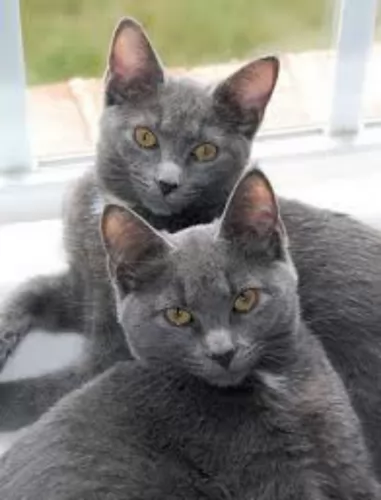 The Korat’s short single coat requires little grooming. You can brush it once a week to remove shed hairs.
The Korat’s short single coat requires little grooming. You can brush it once a week to remove shed hairs.
Trim the nails when they become too long.
Check your cat's eyes and make sure they’re still bright and clear.
Check the ears when you brush your cat and look out for signs of redness which could indicate an infection. Pet groomers or your vet can show you how to groom your cat or you can take your pet to the pet groomers.
Provide your cat with a litter box and keep it spotlessly clean. Remove the feces every single day. The litter will also need to be changed periodically.
Have your cat neutered or spayed.
Vaccinate against the major cat illness.
A good diet is essential for good health, and in fact, a cat’s food needs to be adapted to the different seasons of a cat’s life.
Cats are carnivores and they require nutrients from animal products. They need a mix of vitamins, fatty acids, minerals, and amino acids.
There are excellent commercial cat foods on the market, whether it be dry food, semi-moist food or wet food. These foods have been made to give your cat the right balance of nutrients.
In choosing cat food, it is important to consider your pet’s age and energy levels and it is also important to read the ingredients list. Look for foods in which meat is at the top of the ingredients list.